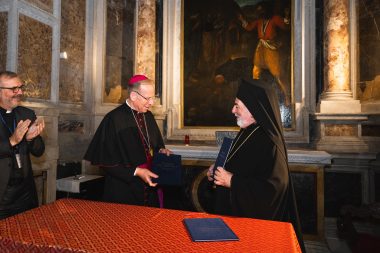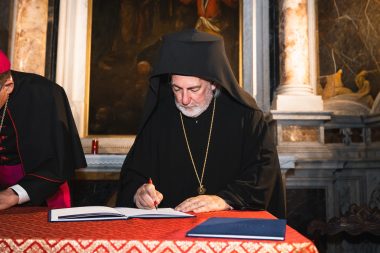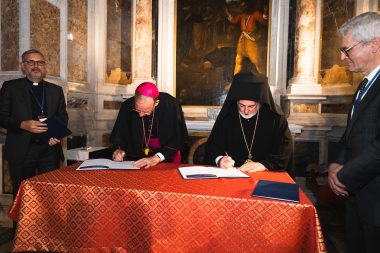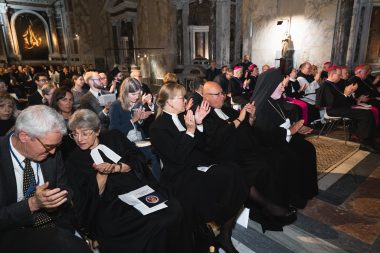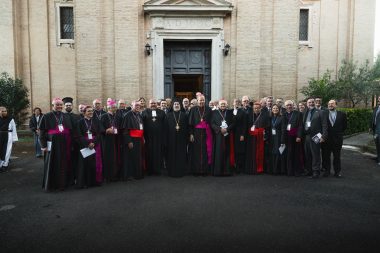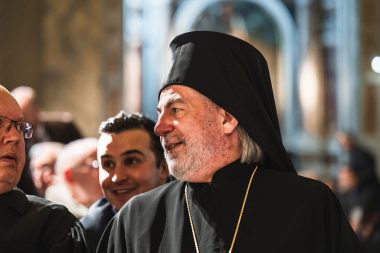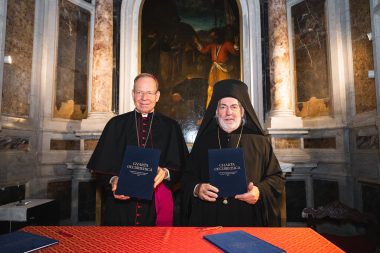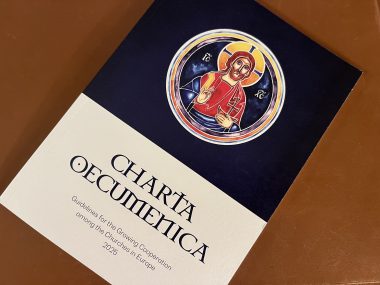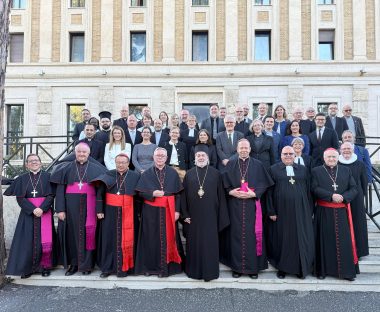With a historic step towards Christian unity, the Council of European Bishops’ Conferences (CCEE) and the Conference of European Churches (CEC) launched the Updated Charta Œcumenica on 5 November 2025 in Rome. This joint document marks a milestone in the ecumenical journey of European churches, renewing their commitment to walk together in dialogue, mutual understanding, and shared witness in response to the challenges of our time.
The updated Charta was officially signed by H. Em. Archbishop NIKITAS of Thyateira and Great Britain, President of CEC, and H.E. Msgr. Gintaras GRUŠAS, Archbishop of Vilnius and President of CCEE. Together, they affirmed the renewed dedication to continue building bridges between churches in Europe.
“This Charta Œcumenica is a call to conscience and cooperation,” said Archbishop Nikitas. “Our commitment to one another as churches is not abstract—it is grounded in shared faith, lived out amid pain, division, and hope. In a fragmented and secular Europe, the Charta urges us to rediscover the strength of our communion and the urgency of our mission. We must proclaim the Gospel together, uphold human dignity, and work side by side for justice, peace, and care for creation. This is our ecumenical vocation—not just to speak of unity, but to live it.”
Archbishop Grušas emphasised that the updated Charta comes at a crucial time in Europe’s journey. “Our churches are called to be signs of unity and hope—not only in words but in action. This Charta equips us to respond together to the wounds of war, displacement, and the ethical challenges of new technologies. It reminds us to walk humbly, confront past failings, and create spaces of healing and reconciliation. It also calls us to listen to the voices of young people and involve them in shaping the path ahead. We are stronger when we stand together.”
Addressing a changing European landscape
Originally signed in 2001, the Charta Œcumenica has long served as a foundational text for ecumenical cooperation across the continent. This newly updated version—launched in the year marking the 1700th anniversary of the Council of Nicaea— reflects the evolving social, spiritual, and ecological landscape of Europe. It addresses the pressing needs of today’s world, including the pursuit of peace and reconciliation, the embrace of migrants and refugees, the urgent call to safeguard creation, and the deepening of relationships with Jewish and Muslim communities.
The document also offers a Christian reflection on the ethical dimensions of new technologies, and it amplifies the role of youth as active contributors and leaders in ecumenism. A central focus throughout is the commitment to offer a united Christian voice in the public sphere—one grounded in compassion, justice, and shared responsibility for the future of Europe.
Healing the past, shaping the future
With a spirit of humility and hope, the updated Charta does not shy away from confronting past wounds and institutional failings. Instead, it offers a renewed call to healing, accountability, and transformation, urging Christians to live their unity through concrete action and witness.
A document born of broad consultation
This version of the Charta was developed through an extensive and inclusive consultation process involving churches, bishops’ conferences, and ecumenical organisations across Europe and beyond. While it carries no legal or doctrinal authority, its strength lies in the moral and spiritual commitment of churches to receive and implement it freely and contextually.
Churches are encouraged to integrate the Charta into their worship, theological education, inter-church dialogue, and community life. It is intended to be a living resource that fosters an ecumenical culture of cooperation and shared mission—from the grassroots to the continental level.
Download here the full text of the updated Charta Œcumenica


